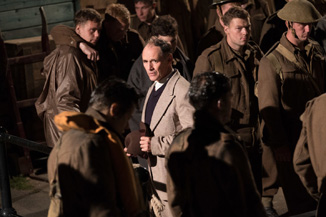Movie Review: Dunkirk
By Felix Quinonez
August 17, 2017
But along the way they pick up a stranded, shell-shocked soldier (Cillian Murphy) floating on the remains of a wrecked ship. He is the sole survivor of an U-boat attack and is desperate to get back to England even if he has to take control of the ship.
The air section is, no doubt the most action-packed part of the movie. It follows three Royal Air Force spitfire pilots who are heading across the English Channel to provide air support for the evacuation at Dunkirk.
On their way there, they encounter some Germans and engage in an aerial dogfight. The leader is shot down, so Farrier (Tom Hardy) takes command. And the third pilot sustains heavy damage and goes down, forcing Farrier to continue alone.
Although he barely speaks, the movie keeps coming back to Farrier. He is the movie’s most “heroic” character. But the movie also reframes the very idea of heroism. Farrier is seen from the view of other characters, as an almost mythical creature sweeping in to save them and then leaving just as quickly as he arrived. And no one really knows who he is or what becomes of him. This serves as a painful reminder that not all heroes get ticker tape parades. Many aren’t remembered or even known about outside of the group of people who were there.
Much has been said about the fact that this is Christopher Nolan’s first war movie, a historically based one, no less. But it should be noted that this is a Christopher Nolan movie first and a war movie second. While it’s often tempting for war movies to center on one heroic character, Dunkirk is more interested in conveying what it means to be a small cog in a very large machine.
In fact, Nolan sidesteps a lot of the war movie conventions. There is very little actual “fighting.” Most of the action viewers expect from a war movie is limited to the aerial dogfights. Dunkirk isn’t about “winning” or “good” triumphing over “evil.” It’s simply about people trying to survive.
One of the most popular clichés war movies embrace is the use of the general or leader giving inspiring speeches to the masses. But Dunkirk subverts that notion in a very interesting manner. It doesn’t have a big name actor portray Winston Churchill to deliver the famous “We shall fight on the beaches…” speech. Instead it is read, almost in passing, by a one of the soldiers off a newspaper.
It might not seem like a big deal but there is actually something very powerful about this scene. And it highlights one of the movie’s main goals. It tries to make us reframe how we think of wars. When we look back on history we often see it in the broad stokes and think of a war as one big event. But the truth is that it’s made up of many small things and people we don’t remember. And by having a seemingly inconsequential character read the speech to his fellow soldier, and by extension the audience, the movie seeks to give credit to the people who actually fought the war, not the leaders who gave speeches.
And unlike many WWII movies it resists the urge to be gung ho about the war. It shows that it isn’t exciting or always heroic. In fact, it turns out that Dunkirk isn’t so much a war film as it is a tale of survival. It’s about the basic instinct to survive, the loss of control, the feeling of powerlessness and how we react to it.
For the most part, the movie doesn’t show us the point of view on those causing the damage; we instead see things from the point of view of those who are on the receiving end. It isn’t until the very end when the movie shows Germans at all and even then they remain out of focus.
Like Steven Spielberg, Nolan understands that there is nothing as terrifying as horror unseen. When a small group of soldiers are seeking shelter inside of a beached fishing boat, we don’t actually need to see the bombs going off outside. Because seeing the looks on the faces of the soldiers makes us feel their fear.
The movie is both intimate and larger than life. But perhaps the most impressive thing about the movie is just how much emotional it winds up being. And it’s emotional in a way that sneaks up on you.
It might initially seem that Dunkirk is more interested in creating visual and technical spectacle. But without our realizing it, the movie is slowly and expertly laying down all the pieces of the puzzle until the whole picture is finally revealed. So by the time the dénouement comes around, the movie grabs you by the heart. It’s as moving as it is surprising, but it brings a tear to your eye nevertheless.
-- Felix Quinonez Jr. is an independent comic book creator living in Brooklyn, NY.
His self-published comic books and graphic novel have been sold in stores in NYC and online. He is the co-editor and contributor of a comic book Anthology called Emanata. That book features the work of many other talented creators from all around the country. You can check out his comic books and read more of his writing at theneonbulletin.com
Continued:
1
2
|
|
|
|




